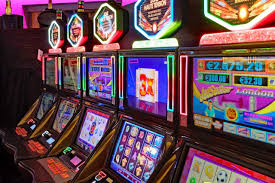Progressive slot machines have long been a cornerstone of the casino experience, with their massive jackpots and tantalizing promises of life-changing payouts. Whether you’re playing in a physical casino or enjoying the thrill from an online platform, progressive slots continue to captivate players worldwide. But what is it that makes these games so enticing, and why do they often seem so addictive? As the popularity of progressive slots continues to surge into 2024, understanding the psychology behind them becomes essential for both players and the industry.
In this article, we’ll explore how progressive jackpot slots tap into the human psyche, creating a compelling experience that keeps players coming back for more, even when the odds are stacked against them.
What Are Progressive Slot Machines?
Before delving into the psychology, it’s important to understand what progressive slots are and how they differ from traditional slot machines. In a progressive slot, a small portion of each bet made by players contributes to a progressive jackpot, which continues to grow as more people play. This jackpot can reach extraordinary amounts, often stretching into the millions of dollars.
There are three primary types of progressive slots:
- Standalone Progressives: These machines are linked to a single slot and have a jackpot that increases as players make bets on that particular machine.
- Local Progressives: These slots are connected across multiple machines within a single casino or online platform. The jackpot grows based on the collective bets of players within that specific location.
- Wide-Area Progressives: These are linked across multiple casinos or online gaming sites, creating enormous jackpot pools. The more widespread the network, the faster the jackpot grows.
While the allure of a massive jackpot is the obvious draw, the psychology behind why players are so drawn to progressive slots goes much deeper than the prize itself.
1. The Illusion of Control: “Near Miss” Effect
One of the key psychological mechanisms at play with progressive slot machines is the illusion of control. Slot machines are games of chance, yet they often give players the false belief that they have some control over the outcome.
In particular, the “near miss” phenomenon plays a crucial role in keeping players engaged. A near miss occurs when the symbols on the reels appear just a few positions away from a winning combination. For example, you might land on two jackpot symbols and a single symbol of another kind, creating the illusion that you were “close” to winning.
Research has shown that near-miss experiences can be highly motivating. Players who experience near misses often feel that they are “on the verge” of hitting the jackpot, which can encourage them to keep playing. This is because the brain rewards near misses in a similar way to actual wins, triggering dopamine release and reinforcing the desire to continue playing.
With progressive slots, the jackpot constantly grows, and near misses seem even more tantalizing. Players often feel that they are just a few spins away from a potentially life-changing win, leading to an increased sense of urgency and desire to continue playing.
2. The Gambler’s Fallacy and “It’s My Turn” Thinking
Another psychological bias that contributes to the addictive nature of progressive slots is the gambler’s fallacy, a cognitive error where players believe that after a series of losses, they are due for a win. This is often referred to as “it’s my turn” thinking. The idea is that because the machine hasn’t paid out in a while, it is statistically more likely to hit soon.
In progressive slots, this thinking is compounded by the idea that the jackpot is “due” to hit. Players may believe that after a long streak of no big wins, the large jackpot is bound to be won soon, and they are the one who will claim it. This fallacy creates a powerful urge to continue playing, even as the odds remain just as low with each spin.
The growing size of the jackpot feeds into this illusion. Players tend to imagine that their persistence will eventually pay off, and the larger the jackpot, the more enticing this belief becomes. The sense of “I’m almost there” is psychologically powerful, leading to a cycle of continuous play.
3. The Power of Small Wins: Reinforcement
Even though the odds of hitting the progressive jackpot are astronomically low, small wins—such as modest payouts or bonus rounds—play a huge role in maintaining player engagement. These frequent small wins create a reinforcement loop that encourages players to keep playing, hoping that their next spin will bring a bigger payout.
This is a principle grounded in behavioral psychology, particularly the concept of intermittent reinforcement. When rewards are given out at irregular intervals (as is the case with progressive slots), the brain’s dopamine system becomes highly activated. Players are essentially “rewarded” for their persistence with small wins, which makes them feel good and encourages them to continue playing, even though the big jackpot remains elusive.
The occasional bonuses or free spins that are often associated with progressive slots are also an important part of this process. They give players a sense of “winning” without ever actually needing to hit the jackpot. This reinforces the habit of playing in the hope that the next spin will lead to a bigger reward.
4. The Jackpot Obsession: Magnification of Desire
The massive, eye-popping jackpots offered by progressive slots play a huge role in amplifying desire and excitement. The size of the jackpot is constantly displayed on the screen, often in a flashy, attention-grabbing way. This visual cue keeps the jackpot at the forefront of the player’s mind and creates a sense of urgency.
In 2024, jackpots can easily grow to millions of dollars, creating a sense of fantasy about what life could be like with such a large sum of money. The thought of a single spin changing your life is a powerful psychological motivator.
Moreover, progressive jackpots are often tied to the idea of instant gratification—the desire for a quick fix to financial problems or personal desires. The possibility of winning a huge sum of money within seconds feeds into the human craving for immediate rewards, which is why players often return to these machines, believing that “this time” they will win big.
5. Escalating Commitment and the Sunk Cost Fallacy
One of the most dangerous psychological traps that progressive slot machines create is the sunk cost fallacy. This cognitive bias occurs when people continue investing time, money, or effort into something because they have already invested a significant amount, even if continuing doesn’t make rational sense.
For instance, after a long period of playing with little to no winnings, players might feel that they have already spent so much time or money on a machine that they must keep playing in order to justify their earlier investment. This creates a cycle of escalating commitment, where players feel compelled to keep playing, hoping that their “time and money” will eventually be rewarded.
The allure of the growing jackpot exacerbates this fallacy, as players may believe that the machine will “pay off” eventually, and that their persistent play will lead to the big win they’ve been hoping for.
6. The Social Element: Competing for the Jackpot
In both physical and online casinos, progressive slots often include social elements such as leaderboards, multiplayer options, or real-time updates on the jackpot size. These elements make the experience more engaging and competitive, adding to the thrill of chasing the jackpot.
For online casinos, some progressive slots even offer community jackpots where players from different platforms are connected to the same pool, further intensifying the feeling that the jackpot is within reach for anyone. The social influence—whether from fellow players, friends, or influencers—can drive a sense of FOMO (fear of missing out), encouraging players to participate in the collective chase for the big win.
Conclusion: Understanding the Psychology to Play Responsibly
Progressive slot machines are designed to be psychologically captivating, utilizing powerful techniques that trigger emotional and cognitive responses. The combination of the near-miss effect, the illusion of control, intermittent reinforcement, and the tantalizing growth of the jackpot creates a potent mix that keeps players engaged, often to their detriment.
While these machines can be entertaining, it’s important for players to recognize the psychological traps they present. In 2024, as the industry continues to evolve, responsible gambling practices should be a priority for both players and operators. By understanding the psychology behind progressive slots, players can make more informed decisions and enjoy these games in a healthier, more mindful way.
For those who feel that gambling is becoming a problem, it’s essential to seek help from responsible gambling organizations or use the self-exclusion tools available at many online casinos.
Join KKClub today for exclusive casino games and big wins – your lucky streak starts here!





